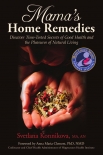Mama's Home Remedies: Discover Time-Tested Secrets of Good Health and the Pleasures of Natural Livin by Svetlana Konnikova (series like harry potter txt) 📗

- Author: Svetlana Konnikova
Book online «Mama's Home Remedies: Discover Time-Tested Secrets of Good Health and the Pleasures of Natural Livin by Svetlana Konnikova (series like harry potter txt) 📗». Author Svetlana Konnikova
The green mist floated into people’s houses through the open windows, doors, and keyholes. While the people slept, they began to breathe easier and those who had suffered from sinus infections, flu, sleeplessness and allergies had a sound sleep filled with sweet dreams as never before. The brave soldiers of the green forest marched through the city, winning one area after another until the city was clean and pure. And even today people are greeted by thousands of fresh junipers; pines; and millions of red, white, and pink geraniums placed at every corner of the city by the green soldiers to guard the people from pollution and sicknesses.
Nature ever flows; stands never still.
Motion or change is her mode of existence.
—Ralph Waldo Emerson (1802–1882), American poet and essayist ƒ
Junipers on the mountains were thickly hung with berries, and the air was unadulterated gin.
—John McPhee (1931–), American writer
ƒ
Winds are advertisements of all they touch, however much or little we may be able to read; telling their wanderings even by their scents alone.
—John Muir (1838–1914), Scottish-born American naturalist ƒ
A Sickness of the 21st Century @ 109
Let us a little permit Nature to take her own way;
she better understands her own affairs than we.
—Michel Euquem de Montaigne (1533–1592), French writer ƒ
The field has eyes, the wood has ears; I will look, be silent, and listen.
—Hieronymus Bosch (1450–1516), Dutch painter
ƒ
Shall I not have intelligence with the earth?
Am I not partly leaves and vegetable mould myself?
—Henry David Thoreau (1817–1862), American writer
ƒ
Besides the motives that have been mentioned, it may be added that the Great Khan is more disposed to plant trees because astrologers tell him that those who plant trees are rewarded with long life.
—Marco Polo (1254–1324), Italian merchant and traveler ƒ
All my life throught, the new sights of Nature
made me rejoice like a child.
—Marie Curie (1867–1934), Polish-born French chemist
ƒ
I think that I cannot preserve my health and spirits,
unless I spend four hours a day at least—and it is commonly more than that—sauntering through the woods and over the hills and fields, absolutely free from all worldly engagements.
—Henry David Thoreau (1817–1862), American writer
110 ^ Mama’s Home Remedies
Chapter 6
Ourselves, Our Children,
Allergens, and Happy Cells
Use the folk medicine recipes in this chapter only
under the guidance of your child’s pediatrician.
Never put off till tomorrow what you can do today.
—Russian proverb
FACTS
Up to two million or 8 percent of children in the United States are estimated to be affected by food allergy. If one parent has allergic disease, the estimated risk of a child to develop allergies is 48 percent. The child’s estimated risk grows to 70 percent if both parents have a history of allergy.21
As you know now, allergens are irritating substances that provoke high sensitivity in the human body. When children are small (from one month to three years old), allergens that affect them can be milk, eggs, peanuts, oranges, and strawberries. Later on (ages three and up), allergens might include medical drugs, detergents, fragrances, weeds, molds Ourselves, Our Children, Allergens, and Happy Cells @ 111
and mildew, substances found in home air ducts, flower pollen, and other substances that penetrate their body through their delicate skin. Animal dander from the hair of domestic pets including dogs, cats, and rabbits can be allergens on contact, as can bird feathers and fur jackets. Any allergic reaction can develop into illness.
Infants and young children usually become ill more readily than older children and their illness may be more intense. This is because the immune system of an infant or young child is not as developed as that of an older child. Allergies and other ailments contracted by infants and children up to six years old develop fast and have a tendency to spread through the body in a matter of hours. For example, small inflammations (blisters) on an infant’s skin may indicate a “general” sickness—sepsis.
Diathesis is a heightened (abnormal) sensitivity of mucous membranes and skin to external irritants. Symptoms usual y appear during the first months of a child’s life. In the second half of the first year of an infant’s life, these signs became much clearer. Some food products show up as diathesis. Closely monitor your child for any reactions from these foods: milk, eggs, cheese, chocolate, cocoa, nuts, oranges, strawberries, soda, or any canned beverages. Consider that diathesis, provoked by sugar or foods that are rich in carbohydrates, is common as a first al ergy. One of the first signs of diathesis, which may appear in the first two or three months of a child’s life, is “milk scab,” yel owish, crusty patches that form on the child’s scalp and above the eyebrows. Some mothers try to remove these scaly patches only to find that they form again and spread to the baby’s cheeks. At first the skin on the cheeks will redden and then become rough to the touch. Dry or wet eczema and its accompanying itching may follow.
Wet eczema is not pretty. First, a rash, which turns to blisters, appears on the skin. These blisters eventually burst, leaving small, wet wounds that dry and form scabs. Dry and wet eczema require different treatments and, once healed, they can return.
Children’s skin rashes typical y occur from three months to





Comments (0)